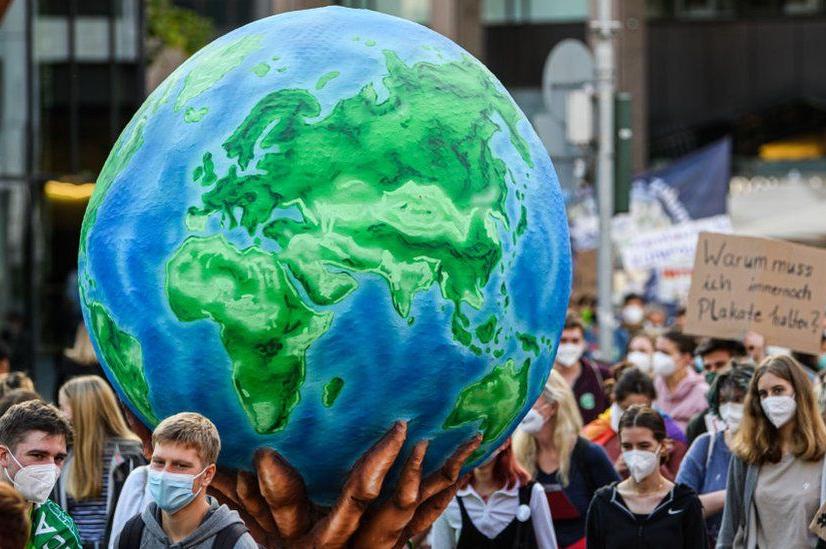Tom Watkins, President and CEO of the Economic Council of Palm Beach County, FL
Nov 29, 2021
Global leaders are meeting now in Glasgow in one of the world’s largest ever summits regarding the climate. It’s a rare opportunity for the U.S. and China to set aside their disputes and focus on a critical shared goal.
Tang Xinhua, Associate Researcher, Tsinghua University’s Institute of International Relations
Nov 18, 2021
China and the United States recently issued a joint declaration on climate action, bringing hope for one of humanity’s most pressing problems and adding momentum to the global low-carbon transition.
Xiao Bin, Deputy Secretary-general, Center for Shanghai Cooperation Organization Studies, Chinese Association of Social Sciences
Nov 18, 2021
The country’s self-sufficiency rate has stayed at around 80 percent, but as it transitions to lower carbon, issues affecting energy security are becoming more prominent. Underlying these are structural problems, starting with high dependence on overseas energy.
Harvey Dzodin, Senior Fellow, Center for China and Globalization
Nov 15, 2021
I don’t know if it’s by accident or design but the United Nations Conference of the Parties (COP26) in Glasgow, and the G-20 Summit that preceded it in Rome, were scheduled around Halloween and the Day of the Dead. Most governments seem afraid to face the existential challenge of climate change and are more spooked by an army of highly-paid lobbyists than by an infinitely more powerful Mother Nature. At the same time, however, promising innovations coming from NGOs and a core of socially responsible companies offer a slim glimmer of sunshine amidst the gloom.
Sun Chenghao, Fellow, Center for International Security and Strategy of Tsinghua University; Munich Young Leader 2025
Liu Yuning, a PhD candidate, China Foreign Affairs University
Nov 11, 2021
The United States has begun to consolidate a Western consensus in many respects, but its competitive perspective on global issues will eventually cost it credibility and appeal in the field of climate governance.

Tang Xinhua, Associate Researcher, Tsinghua University’s Institute of International Relations
Nov 01, 2021
Modern eco-civilization based on harmony between humanity and nature is the way of survival — the way for humankind to effectively cope with the climate crisis and achieve climate security in the 21st century.
Leonardo Dinic, Expert in Geopolitics and International Business, the Future of Work, and Emerging Technologies
Oct 26, 2021
The new Taliban regime in Kabul is faced with the responsibility of governing an impoverished, underdeveloped nation recovering from decades of destruction. Their biggest asset is the nation’s massive mineral deposits, which neighboring China will likely assist in extracting.
Andrew Sheng, Distinguished Fellow at the Asia Global Institute at the University of Hong Kong
Xiao Geng, Director of Institute of Policy and Practice at Shenzhen Finance Institute, Chinese University of Hong Kong
Oct 11, 2021
The planet is heating up – and so are global geopolitics. With less than two months until the crucial United Nations Climate Change Conference (COP26) in Glasgow, the United States and China must commit to cooperate on the existential challenge global warming represents. But bilateral relations remain burdened by mistrust, antagonism, and even warmongering.
Li Zheng, Assistant Research Processor, China Institutes of Contemporary International Relations
Sep 06, 2021
The U.S. intelligence community’s effort will not help prevent a future pandemic. Many countries will be deeply skeptical of America’s intentions and will be wary that it’s only looking for an excuse to steal biological information.
Peng Nian, Director of Research Centre for Asian Studies, China
Chow-Bing Ngeow, Director of the Institute of China Studies, University of Malaya, Malaysia
Putri Rakhmadhani Nur Rimbawati, Former Researcher of the ASEAN Studies Center, Universitas Gadjah Mada, Indonesia
Aug 23, 2021
Scholars from China and around Southeast Asia respond to questions about how the region views the second push by the United States to identify the origins of the coronavirus.
Back to Top

- China-US Focus builds trust and understanding between the U.S. and China through open dialogue among thought leaders.
- Our Offerings
- Topics
- Videos
- Podcasts
- Columnists
- Research Reports
- Focus Digest
- Stay Connected
-
Thanks for signing up!
- Get the latest stories from China-US Focus weekly.